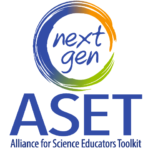
Learning Objectives
Overview
Learning objectives are the lesson level objectives, most recently referred to as learning performances (Krajcik et al. 2014, Harris et al. 2016). A learning objective is an explicit statement regarding what knowledge and skills your students will be able to understand and demonstrate at the end of the lesson or unit. Learning objectives should focus on measurable and observable outcomes students will be able to demonstrate, not what form the instruction will take (Bybee, 2013). Clearly written learning objectives can both provide students precise statements of what is expected of them and provide guidelines for assessing student progress.
Learning objectives focus on student performance. In addition to specifying the content that students are expected to understand, action verbs that are specific, such as list, describe, report, compare, demonstrate, and analyze, state the behaviors students will be expected to perform. In three-dimensional science lessons and units, learning objectives are framed in the context of not only what content students will know, but what students can do with this science content as related to Science and Engineering Practices (SEPs) and Crosscutting Concepts (CCCs).
Instructions for 3-D Map
List the learning objectives students should demonstrate by the end of the lesson or unit. Your learning objectives should relate to the performance expectations (PE) for the lesson or unit, focusing on components of the larger PE you are exploring. Unlike the performance expectation, a learning objective is focused on a smaller segment of the instructional sequence. Once you have selected the three dimensions (SEPs, DCIs, CCCs) on which your lesson or unit will focus, write the learning objectives that include these three dimensions.
Guiding Questions
When writing learning objectives, you should ask yourself:
- What should students be able to do at the end of each lesson or activity?
- How do I want students to demonstrate this learning?
- How will I be able to measure and observe student learning?
- Do my learning objectives clearly connect to the phenomenon and conceptual goals for the lesson or unit?
- How does/do my learning objective(s) build toward students’ ability to complete the performance expectation(s)?
Example of two Learning Performances building towards MS-PS1-2: Analyze and interpret data on the properties of substances before and after the substances interact to determine if a chemical reaction has occurred (example from Harris et al., 2016)
Learning Performance 1 – Students analyze and interpret data to determine whether substances are the same based upon patterns in characteristic properties.
Learning Performance 2 – Students construct a scientific explanation about whether a chemical reaction has occurred using patterns in data on properties of substances before and after the substances interact.
Some verbs for use in writing learning objectives
(from http://www.csun.edu/science/ref/plans/learning-objectives.html)
| Verbs that relate to categories
(based on Blooms Taxonomy) |
|
| Knowledge | Cite, collect, copy, define, describe, duplicate, enumerate, identify, label, list, match, memorize, name, order, quote, recall, recognize, record, recount, relate, repeat, reproduce, show, specify, state, tabulate, tell |
| Comprehension | Associate, classify, convert, describe, differentiate, discuss, distinguish, estimate, explain, express, extend, group, identify, indicate, order, paraphrase, predict, report, restate, retell, review, select, summarize, translate, understand |
| Application | Administer, apply, calculate, change, chart, choose, collect, compute, construct, demonstrate, determine, develop, discover, employ, establish, examine, exhibit, illustrate, interview, manipulate, modify, operate, practice, predict, prepare, produce, relate, report, schedule, show, sketch, solve, transfer, use |
| Analysis | Analyze, arrange, breakdown, categorize, classify, compare, connect, contrast, correlate, detect, diagram, differentiate, discriminate, dissect, distinguish, divide, examine, experiment, group, identify, illustrate, inspect, interpret, investigate, order, organize, outline, probe, question, relate, select, separate, survey, test |
| Synthesis | Adapt, assemble, collaborate, combine, compile, compose, concoct, construct, contrive, create, design, develop, devise, formulate, generalize, generate, hypothesize, imagine, incorporate, integrate, invent, modify, organize, originate, plan, predict, produce, propose, reconstruct, reorganize, revise, speculate, systematize |
| Evaluation | Appraise, argue, assess, conclude, convince, criticize, decide, deduce, defend, determine, discriminate, infer, interpret, judge, justify, persuade, prioritize, rate, rank, recommend, relate, revise, score, support, value, validate |
References
National Research Council. (2012). A Framework for K-12 Science Education: Practices, Crosscutting Concepts, and Core Ideas. Committee on a Conceptual Framework for New K-12 Science Education Standards. Board on Science Education, Division of Behavioral and Social Sciences and Education. Washington, DC: The National Academies Press.
Bybee, R. W., (2013). Translating the NGSS for Classroom Instruction. NSTA Press
Krajcik, J., Codere, S., Dahsah, C., Bayer, R., & Mun, K. (2014). Planning instruction to meet the intent of the Next Generation Science Standards. Journal of Science Teacher Education, 25(2), 157-175.
Harris, C. J., Krajcik, J. S., Pellegrino, J. W., & McElhaney, K.W. (2016). Constructing assessment tasks that blend disciplinary core Ideas, crosscutting concepts, and science practices for classroom formative applications. Menlo Park, CA: SRI International.
